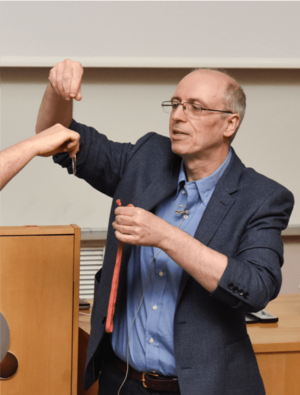David Leigh (scientist) facts for kids
Quick facts for kids
David Leigh
|
|
|---|---|

Leigh in 2019
|
|
| Born |
David Alan Leigh
31 May 1963 Birmingham, UK
|
| Nationality | British |
| Alma mater | University of Sheffield (BSc, PhD) |
| Known for | Catenanes, Rotaxanes, Molecular knots, Molecular machines |
| Awards | FRS (2009) FRSE (2005) Feynman Prize (2007) Izatt-Christensen Award (2007) Perkin Prize (2017) Royal Society Bakerian Medal (2013) Royal Society of Edinburgh Royal Medal (2021) |
| Scientific career | |
| Fields | Supramolecular chemistry Organic chemistry |
| Institutions | University of Manchester University of Edinburgh University of Warwick |
| Thesis | The synthesis and properties of novel and natural macrocyclic trichothecenes (1987) |
David Alan Leigh is a famous British chemist born in 1963. He is known for building incredibly tiny machines and structures using individual molecules. He works as a professor at the University of Manchester.
Before this, he was a professor at the University of Edinburgh and the University of Warwick. His amazing work has earned him many awards, including being a Fellow of the Royal Society.
Contents
Learning and Becoming a Scientist
David Leigh went to Codsall Community High School. He then studied at the University of Sheffield. This is where he learned a lot about chemistry.
Building Tiny Machines and Knots
Professor Leigh is famous for creating ways to control how molecules move and connect. Imagine building something so small you can't even see it! He makes things like:
- Rotaxanes: These are molecules threaded together like beads on a string.
- Catenanes: These are molecules linked together like chains.
- Molecular knots: These are molecules tied into tiny knots.
He also built some of the first molecular machines and molecular robots. These are like super-tiny engines or arms made from molecules.
Amazing Molecular Creations
- Molecular Walker: In 2009, his team made a tiny "walker" molecule. It could move along a short molecular track. This is similar to how proteins move in our bodies.
- Smallest Molecular Knot: In 2011, they tied the smallest molecular knot ever! It had only 76 atoms. They also made a bigger knot with five crossing points.
- Complex Knots: His group has made even more complex knots. One is called an 819 knot. They also made a "molecular endless knot," like a tiny Chinese knot.
- Molecular Robot Arm: In 2013, they created a tiny robot arm. It could move molecular pieces between spots just 2 nanometers apart. A nanometer is one billionth of a meter!
- Molecule-Building Robot: In 2017, they made a robot that could be programmed. It could build different versions of molecules. This was a big step towards a "molecular assembler". People said it was like "science fiction becomes fact"!
- Molecular Fabric: In 2020, his team wove polymer chains together. They made a molecular fabric. It had millions of "threads" per inch. This is much finer than any human-made fabric.
Nobel Prize Connection
In 2016, some people thought Professor Leigh might win a Nobel Prize in Chemistry. This was for his work on synthetic molecular machines. The prize that year went to other scientists, but their work was also about building these amazing tiny machines. This shows how important and exciting his research is!
Sharing Science and Fun
Professor Leigh likes to share his science with everyone.
- His 819 molecular knot is in the 2019 Guinness Book of World Records.
- He helped create a funny science music video called 'Nanobot'. It explains nanorobotics.
- He has a special prize at his old school. It encourages girls and children from less fortunate backgrounds to study science.
Outside of science, David Leigh is a national champion at contract bridge. He is also a talented magician! He often mixes magic and science in his talks. This makes learning about chemistry even more fun.
Awards and Special Recognitions
Professor Leigh has received many important awards for his work:
- Royal Society of Chemistry Award for Supramolecular Chemistry (2003)
- Fellow of the Royal Society of Chemistry (2004)
- Institute of Chemistry of Ireland Annual Award for Chemistry (2005)
- Fellow of the Royal Society of Edinburgh (2005)
- Royal Society-Wolfson Research Merit Award (2005)
- EPSRC Senior Research Fellow (2005–2010)
- Royal Society of Chemistry Award for Nanotechnology (2005)
- Royal Society of Chemistry-Real Sociedad Española de Química (RSC-RSEQ) Prize for Chemistry (2007)
- International Izatt-Christensen Award in Macrocyclic Chemistry (2007)
- Foresight Nanotech Institute Feynman Prize (Theory) (2007)
- EU Descartes Prize for Research (2007)
- European Research Council Advanced Grants (2008, 2013, 2017)
- Fellow of the Royal Society (2009)
- Royal Society of Chemistry Merck Award (2009)
- Royal Society of Chemistry Tilden Prize (2010)
- Royal Society Bakerian Medal (2013)
- Royal Society of Chemistry Pedler Award (2014)
- Academia Europaea (2015)
- Royal Society Research Professor (2016)
- Royal Society of Chemistry Perkin Prize for Organic Chemistry (2017)
- International Society for Nanoscale Science, Computation and Engineering Nanoscience Prize (2019)
- Royal Medal, Royal Society of Edinburgh (2021)
 | Valerie Thomas |
 | Frederick McKinley Jones |
 | George Edward Alcorn Jr. |
 | Thomas Mensah |

